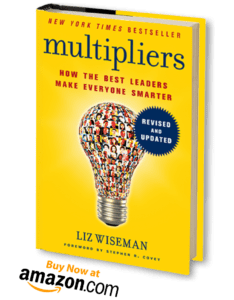Do you ever read a book that gives you the right terminology to discuss ideas? It’s such a great feeling to have a new vocabulary to express concepts you previously couldn’t explain. That’s how I felt after I finished reading Multipliers: How the Best Leaders Make Everyone Smarter by Liz Wiseman. If you want to read the full book, buy it here.
Here’s the basic concept: Multipliers grow people and people then work harder and smarter, while Diminishers take their employees for granted, stunt their growth, and underutilize their abilities. Another way to understand the Multiplier mindset is to look at each of the five disciplines.
The Five Disciplines of the Multiplier
Each of these made a lot of sense to me. Then, I got to this idea of “Accidental Diminishers.” I was still thinking, “Yes, this is so true,” but I was also thinking, “Yes, this is so me.”
”To lead on purpose, we must understand how we diminish by accident.
Liz WisemanMultipliers
Intuition and good intentions are not enough to make us Multipliers. We have to be deliberate in leadership in order to ensure that people feel valued and truly grow. So, without further ado, here are the nine Accidental Diminisher Tendencies:
Any of those stand out to you? Personally, I know I have major Rescuer, Optimist, and Perfectionist tendencies… okay, and Pacesetter, Idea Guy, and Always On, too. It’s challenging to not fall into these traps, because many of these are “good” things, right? It’s like anything else though, it has to be given in small doses.
At first, I was discouraged when I realized I had a number of these traits. However, I know it’s SO much better to be aware of them than oblivious to these habits. Now, I can work on fixing them. In fact, Multipliers has a number of learning experiments developed to help combat these tendencies. I might have to try a few out!
Are you wondering where your weak spots are? Take the “Are you an Accidental Diminisher?” quiz to find out.
Kayla is our resident wordsmith and grammar aficionado. With an editorial background and experience working for a major magazine, she is passionate about creating unity between words and design…














